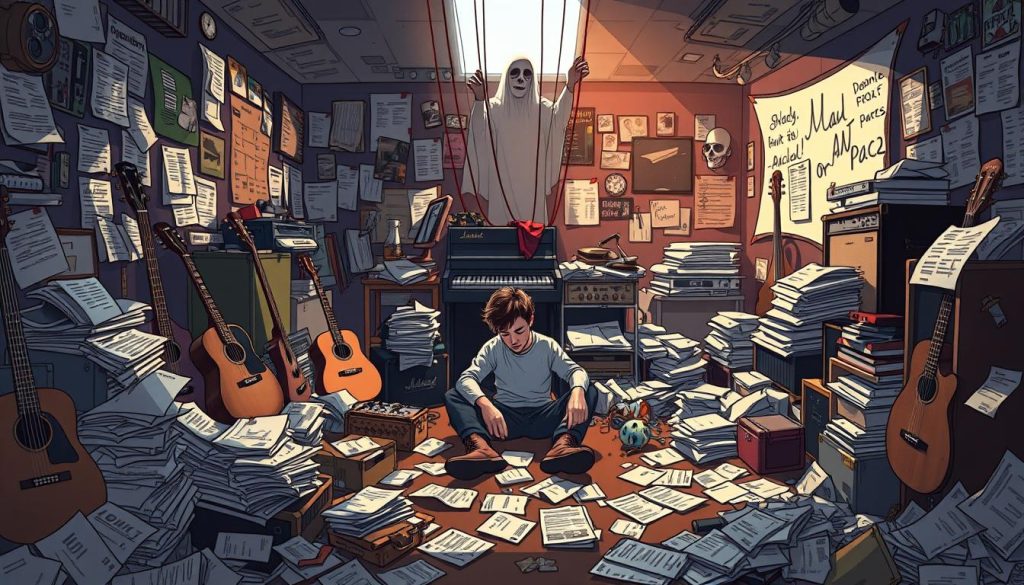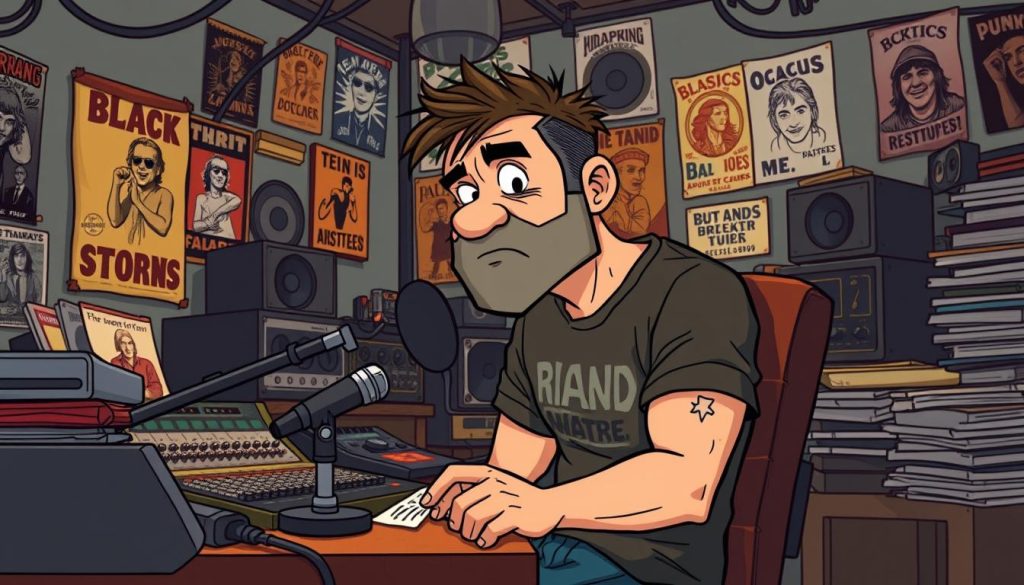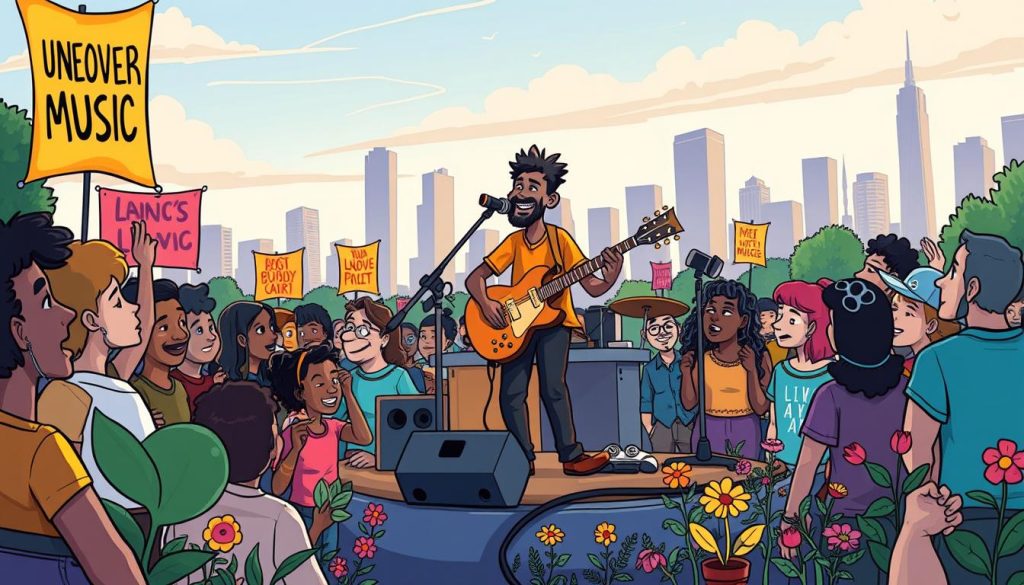The music industry is seen as a capitalist patriarchy. Men hold most of the power, leading to exploitation of indie artists, especially women. Female pop stars often have to use sexualized images to market their songs. This has gotten worse over the last ten years.
More female artists are now using nudity in their music videos. This shift has sparked a lot of concern. Many believe that women must use sexualization to reach more people. This puts their personal expression against the industry’s constant demands.
Key Takeaways
- The music industry is dominated by a capitalist patriarchy, with men holding significant power in various roles.
- Female pop performers often struggle to market their music without resorting to sexualized imagery, a prevalent issue in the industry.
- The trend of female artists being sexualized in music videos has increased over the past decade, with nudity becoming a primary selling point.
- Indie artists, particularly women, feel the pressure to embrace sexualization or nudity to appeal to a broader audience, creating a conflict between artistic expression and market demands.
- The exploitation of indie artists, especially women, is a significant concern within the music industry, with power dynamics heavily favoring record labels and industry gatekeepers.
The Pornification of Pop Culture
The music industry is facing a big issue. Female artists are often expected to show nudity and sexual images in their videos and live shows. This is to get more fans and sell more records. This problem comes from the industry’s focus on making money and its male-dominated structure.
Some artists might say they’re empowered by this. But, the truth is often about being used and disrespected. Women in music are treated differently than men. This shows the deep-seated sexism in the industry. We need more openness and support for artists’ rights.
Pornographic Influences in Music Videos
For decades, there’s been a debate about pornography in schools and pop culture. Since the 1960s, there have been many discussions about what is considered porn. Today, we see more books and movies exploring these themes, making them part of our conversations about freedom of speech.
In music, we see this trend too. Artists like Cardi B and Rihanna use sexy images in their videos and live shows. This helps them get more fans. But, it also means they’re seen more for their looks than their music.
Music videos with sexual content can shape how young people see gender and sex. The media makes a big deal out of these images. This makes it seem like women are valued more for their bodies than their talents.
Steve Albini: The Underground’s Uncompromising Gatekeeper
Steve Albini is a big name in indie music. He’s known for his work with Big Black and Shellac. His blunt approach and indie ethics have made him a controversial figure.
Albini is respected for keeping music pure and authentic. He helps independent artists capture their raw energy. His refusal to go along with the mainstream has made him a gatekeeper of the underground.
Albini’s recording style is simple and sincere. He’s worked with many artists, from Pixies to Nirvana. He sticks to his indie roots, even when it’s hard.
Albini’s tough image hides his deep love for music. His commitment to authenticity has won him respect in the underground. He’s a hero to indie artists who want to avoid the mainstream’s traps.
| Year | Event |
|---|---|
| Early 1980s | Steve Albini launched his career as the leader of Big Black, a band known for its sound and visions, appealing to record store clerks and those seeking aggressive music. |
| 1996 | Albini produced Bush’s album “Razorblade Suitcase.” |
| 1994 | Albini’s controversial letter to critic Bill Wyman critiquing artists Liz Phair, Smashing Pumpkins, and Urge Overkill. |
| 1985 | Release of the single “Pray I Don’t Kill You Faggot” by Albini’s short-lived band Run Nr Run. |
| Early 1990s | Albini wrote a scathing article critiquing bands he worked with, including the Pixies and Poster Children. |
| Late 2021 | Albini expressed public contrition for his past statements and actions, surprising many, who remembered him as an incendiary personality. |
Albini’s dedication to indie music is unmatched. His refusal to compromise has earned him respect and criticism. His skills and indie ethics have made him a key figure in the underground.
indie artists exploitation
The music industry has a dark side, especially for indie artists. They face unfair contracts and royalty disputes. These challenges threaten their creative freedom and income.
Indie artists often find themselves at a disadvantage against big record labels. These labels own the master recordings, giving artists little control. The money split is usually in the label’s favor, leaving artists with less profit.
Streaming platforms have made things worse. Despite the shift to digital, indie artists struggle to get fair pay for their music. The way streaming platforms calculate royalties is unclear, making artists feel underpaid and undervalued.
| Issue | Impact on Indie Artists |
|---|---|
| Unfair Contracts | Indie artists often sign contracts with unfavorable terms, such as the label retaining ownership of master recordings or disproportionate revenue splits. |
| Royalty Disputes | Indie artists face challenges in ensuring they receive the royalties they are owed, especially with the rise of streaming platforms. |
| Streaming Platform Exploitation | The opaque nature of streaming platform royalty calculations has left many indie artists feeling undervalued and exploited. |
To fix these problems, the music industry needs change. Indie artists must come together to demand fair contracts and better pay. By speaking out and pushing for change, they can protect their rights and create a better future for music.
Taylor Swift: A Cultural Phenomenon
Taylor Swift has become a huge name in culture, not just music. She’s one of the top-selling artists of our time. Her career has changed how we see and listen to music.
Swift’s Impact on the Music Industry
Taylor Swift has made a big difference in the music world. She’s pushed for better deals for artists and more control over their work. Her fight for fair treatment has inspired many others to stand up for their rights.
Swift has a huge fan base, with over 100 million fans worldwide. Her songs have been streamed billions of times. She’s won 12 Grammys, making her a true icon in music.
| Key Metrics | Values |
|---|---|
| Monthly Spotify Users | 80 million |
| Presale Ticket Demand | 14 million people |
| Ticket Price Range | $200 to $22,000 |
| Estimated Earnings per Concert | $9 million |
| Total Tour Revenue | Over $780 million |
| Contribution to US Economy | $4.6 billion |
Taylor Swift has explored many music styles, from country to pop. Her move to re-record her songs has been a huge success. This shows her lasting impact on music and culture.
“Taylor Swift has emerged as a true cultural phenomenon, transcending the music industry and becoming a dominant figure in popular culture.”
Power Dynamics and Advocacy
The music industry has a big power gap. Major labels often take advantage of indie artists with unfair deals and unclear rules. This makes it hard for indie musicians to protect their work and stay true to their art.
Long contracts can lock artists into bad deals early in their careers. They face many problems, like clauses that take too much of their future earnings. Artists also struggle with contracts that never end and not getting their work promoted.
Artists like Taylor Swift are fighting back. They use their fame to push for changes in the industry. They want to make sure artists get fair treatment and can own their work.
There are also worries about racism and sexism in the industry. Laws like the Right of Reversion and the Seven-Year Rule help protect artists. Experts suggest artists should keep their rights, have shorter contracts, and have judges watch over deals to stop abuse.
The case of Britney Spears shows how a conservatorship can control an artist’s life and money. New research from Duke University found that passion for work can make artists more vulnerable to being taken advantage of.
The music world needs more advocacy to fix these problems. Artists and their fans must keep pushing for fair treatment. This way, they can make the industry better for everyone.
| Issue | Impact | Advocacy Efforts |
|---|---|---|
| Unfair Contracts | Trapping artists, lack of adequate compensation | Pushing for shorter contract terms, copyright ownership |
| Royalty Disputes | Depriving artists of rightful earnings | Promoting transparency in streaming and recording structures |
| Lack of Transparency | Undermining artist rights and artistic integrity | Advocating for judicial oversight to prevent exploitation |
Conclusion
The music industry often takes advantage of indie artists. They face many challenges that harm their creative freedom and integrity. Artists are pushed to show too much of themselves and deal with unfair contracts.
But, artists like Taylor Swift are changing things. They use their fame to push for better treatment and rights. Artists like Bob Dylan and Patti Smith have also used their music to speak out on important issues.
We need to keep fighting for indie artists’ rights. This fight is key to making the music industry fairer. By supporting indie artists, we can help create a better future for music.
FAQ
What are the exploitative practices faced by indie artists in the music industry?
What is the “pornification of pop culture” and how does it impact indie artists?
Who is Steve Albini, and how has he impacted the independent music scene?
How have artists like Taylor Swift impacted the music industry and advocated for indie artists’ rights?
How can the power imbalance between indie artists and the music industry be addressed?
Source Links
- Miley Cyrus: does the music business exploit women? | The panel
- Exploited Writers in an Unfair Industry
- FEATURE: Sexual Expression and Exploitation in the Music Industry — Music Musings & Such
- Pornos devolve into a lesser art form
- Investigating the Hyper-sexualization of Women in the Music Industry
- The Groupie Myth: How Teens Are Exploited Both On the Road and Online | KQED
- The evolution of Steve Albini: ‘If the dumbest person is on your side, you’re on the wrong side’
- The Zine Community and the Exploitation of Artists
- The sexism scandal at Burger Records proves that indie music culture needs to be detoxified
- 6 Typical Music Industry Scams Targeting Indie Artists
- A Call for Indie Music’s Much-Needed Reckoning | Arts | The Harvard Crimson
- The Biggest Problem For Small and Indie Musicians
- The Music Industry Domination of Taylor Swift
- The Taylor Swift phenomenon
- Selling Out for a Song: “Artist Abuse” and Saving Creatives from Servitude and Economic Disadvantage in the Entertainment Industry
- Why Do Employers Lowball Creatives? A New Study Has Answers | KQED
- The Intersection of Indie Music and Activism: Music Platform for Social Change
- Just Say No to 360s: Hip-Hop’s Claim of Economic Exploitation



